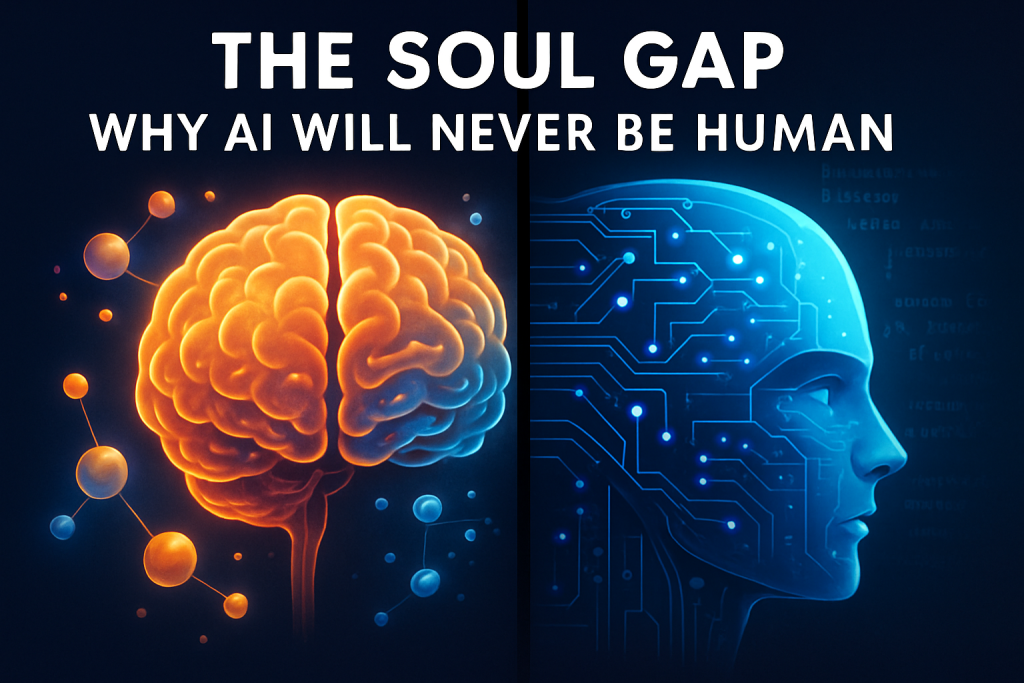
Every time AI takes another leap—writing essays, creating art, driving cars—it’s tempting to wonder: are we building machines that could one day become… human?
The short answer? No. And here’s why: we are emotional creatures, chemically powered in ways machines can never replicate.
The Human Brain: A Symphony of Chemicals
Our brains are not just grey matter crunching numbers. They are living, breathing ecosystems of chemical reactions that shape our every thought, mood, and action.
Here are some of the chemical messengers that make us who we are:
- Dopamine – The motivation molecule. Released when we anticipate or achieve something pleasurable, it fuels our drive and focus.
- Serotonin – Regulates mood, anxiety, and happiness. When it’s low, we feel depressed. When it’s high, we feel calm and balanced.
- Oxytocin – Known as the love hormone. It promotes trust, bonding, and intimacy.
- Cortisol – The stress hormone. It kicks in when we feel threatened and triggers fight-or-flight responses.
These neurotransmitters constantly interact, creating the vast landscape of human emotion. They influence everything from our split-second decisions to lifelong relationships. We don’t decide to feel—we just feel. And those feelings often drive our actions before logic ever gets a say.
AI: All Logic, No Limbic System
AI doesn’t feel. It doesn’t have a body. It doesn’t produce hormones. There’s no heart pounding before a big decision. No warm rush from a heartfelt compliment. No tears, no joy, no fear.
Here’s how it works:
AI systems process input using algorithms and statistical models. They identify patterns based on training data and predict outcomes. When they make a “decision,” it’s not emotional. It’s mathematical.
Even advanced models like ChatGPT or Claude can simulate emotional language—but they don’t experience it. If AI says, “I’m sorry to hear that,” it’s because the data suggests it’s an appropriate response, not because it feels compassion.
Decision-Making: Chemicals vs. Code
| Trait | Humans | AI |
|---|---|---|
| Emotion | Driven by chemicals like dopamine, serotonin, cortisol | Has none |
| Decision-making | Influenced by emotions, experiences, biases, empathy | Influenced by data, rules, and logic |
| Learning | Based on real-world experience and feelings | Based on training data |
| Consciousness | Possibly self-aware | No awareness |
| Morality | Developed through culture, empathy, and upbringing | Must be programmed |
Why This Matters
People fear that AI will replace us. But AI doesn’t want anything. It doesn’t have goals or dreams or fears. It has no concept of pain or joy. That’s not to say AI isn’t powerful—but it’s not alive.
Human behavior is beautifully messy. We cry at songs, laugh at mistakes, fall in love with strangers, and sometimes act against logic because of what we feel. That emotional unpredictability—powered by millions of years of biology—is what makes us human.
AI can mimic. But it cannot be.
And that’s what will always separate the code from the soul.
Share Your Thoughts
Do you think AI could ever truly understand emotion? Or is that something forever out of reach?
Let me know in the comments—and if you enjoyed this, check out more at BarryHugo.com and follow me on X.com for more insights like this!
